 Petzlover
Petzlover Brittany is originated from France but Sloughi is originated from Morocco. Brittany may grow 20 cm / 7 inches shorter than Sloughi. Brittany may weigh 8 kg / 17 pounds lesser than Sloughi. Brittany may live 3 years less than Sloughi. Brittany may have more litter size than Sloughi. Both Brittany and Sloughi requires Low Maintenance.
Brittany is originated from France but Sloughi is originated from Morocco. Brittany may grow 20 cm / 7 inches shorter than Sloughi. Brittany may weigh 8 kg / 17 pounds lesser than Sloughi. Brittany may live 3 years less than Sloughi. Brittany may have more litter size than Sloughi. Both Brittany and Sloughi requires Low Maintenance.
 One of the most intense bird dog breeds in existence is the Brittany, bred for hunt. The breed used to be called the Brittany Spaniel, but since the breed is closer to a setter or pointer, that moniker has been dropped. The Brittany is named for the French Province in which they were originally developed. Sometime from the 17th to the 19th centuries, the breed was developed. Images of a very similar dog can be found on 17th century paintings and tapestries. However, the first written description comes from 1850 by a Reverend Davies, describing a hunting episode. The breed was recognized officially in the early part of the 20th century and made a splash at the 1900 Paris Dog Show.
One of the most intense bird dog breeds in existence is the Brittany, bred for hunt. The breed used to be called the Brittany Spaniel, but since the breed is closer to a setter or pointer, that moniker has been dropped. The Brittany is named for the French Province in which they were originally developed. Sometime from the 17th to the 19th centuries, the breed was developed. Images of a very similar dog can be found on 17th century paintings and tapestries. However, the first written description comes from 1850 by a Reverend Davies, describing a hunting episode. The breed was recognized officially in the early part of the 20th century and made a splash at the 1900 Paris Dog Show.
The first official standards were written in about 1907 and the breed was recognized by the American Kennel Club (AKC) in 1934.The Brittany is expected to point to and then retrieve birds and other small ground game. Because the Brittany both points and retrieves they are known in the U.K. as a Hunt, Point and Retrieve breed or an HPR, and they have more Dual Champions than the rest of the AKC Sporting group.
There are actually two types of Brittanys in the minds of many breeders. There is the “French” Brittany and the “American” Brittany. When the breed arrived in the United States in 1931 they became immensely popular in a short period of time. In 1942 American Breeders began the American Brittany Club, rewriting the French standard to fit the dog they knew. Today there are definitely difference between the two sub-sets that can easily be seen. The French dog is smaller than the American dog. The American dog is a runner pacing ahead of the hunter while the French dog works more closely with their human companions. Another visible difference is that the French accept black spotted Brittanys, while in the United States a black spotted coat is considered a fault. Both sub-sets are known for their willingness to follow human directions, their eagerness for the hunt, and their agility and speed.
Unfortunately, the European wars took their toll on this breed as they did on many others. Following the second World War, their numbers in Europe were drastically reduced. The French had stop breeding them altogether during the war. It was in this depleted gene pool that the French agreed to accept the black spotted Brittany. Along with the U.S., Canada also does not recognize the black spotted Brittany.
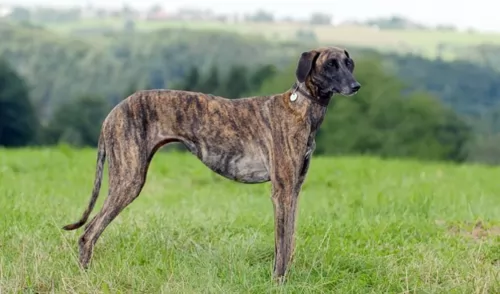 The Sloughi is an ancient dog breed, dating back to the 13th century, and coming from Morocco, North Africa.
The Sloughi is an ancient dog breed, dating back to the 13th century, and coming from Morocco, North Africa.
Much of its history isn’t well known. The dog is a member of the sighthound family. They were originally used for hunting purposes.
The world wars saw their numbers declining. The first Sloughi dog was introduced to the United States in 1973. It was in 1989 that the American Sloughi Association was founded. The dog was also recognized by the American Kennel Club as a Foundation Stock Service breed in 1997. The dog has also been recognized by FCI in the Sighthounds group.
They are rare in the United States and if you wanted to buy one of these dogs you would stand a better chance of looking for a breeder, and then there may be a waiting list.
 The Brittany is much like other hunting dogs – pointers and retrievers – in size and stature. He is solid and strong but not heavy. He is compact with an average size head and floppy ears, docked tails or short natural tails, and expressively intelligent looking eyes. He is athletic, energetic, and alert. He has a long, elastic and free gait. The French dog is smaller and the dog with black spots is accepted. The American Brittany is larger and only a tri-color of orange, liver and white is acceptable.
The Brittany is much like other hunting dogs – pointers and retrievers – in size and stature. He is solid and strong but not heavy. He is compact with an average size head and floppy ears, docked tails or short natural tails, and expressively intelligent looking eyes. He is athletic, energetic, and alert. He has a long, elastic and free gait. The French dog is smaller and the dog with black spots is accepted. The American Brittany is larger and only a tri-color of orange, liver and white is acceptable.
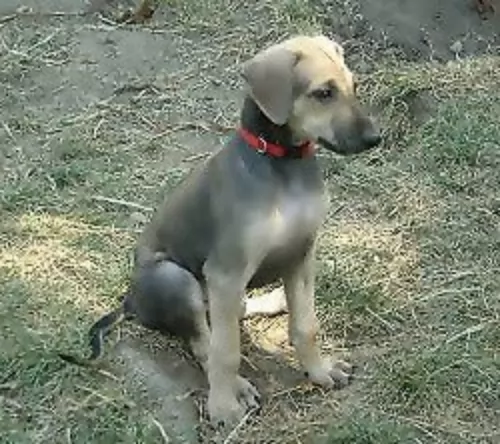 The Sloughi is a big dog, tall and slender. The head is also long and elegant. He stands between 61 and 72cm, both male and female, and he weighs in the region of 18 to 28kg.
The Sloughi is a big dog, tall and slender. The head is also long and elegant. He stands between 61 and 72cm, both male and female, and he weighs in the region of 18 to 28kg.
Looking much like a large Greyhound, the leggy dog has a noble look about him. Known for his hunting skills, he is fast and agile. In fact he is nicknamed the ‘Arabian Greyhound’.
The short straight hair makes him always look well groomed and clean. He sheds moderately throughout the year. Colors of the coat can be a fawn color, sandy, reddish brown or brindle and some come with the black mask and others without. He has medium length floppy ears and a long tail
The Sloughi loves his human family but is essentially a one-person dog. He is affectionate and loyal but can be quite stubborn, Having him trained and socialized does wonders and makes him amicable and well mannered.
He is quiet and intelligent and would prefer to be in a family with older children, and particularly with children who have been taught how to be kind and respectful with animals.
 The Brittany is particularly trainable and friendly. They love to play and are sweet-natured. They don’t due well with harsh correction though and a stern look will cause them to wither. Socialize them young or they can become shy around strangers. They are loyal and family oriented. They can easily become attached to their humans.
The Brittany is particularly trainable and friendly. They love to play and are sweet-natured. They don’t due well with harsh correction though and a stern look will cause them to wither. Socialize them young or they can become shy around strangers. They are loyal and family oriented. They can easily become attached to their humans.
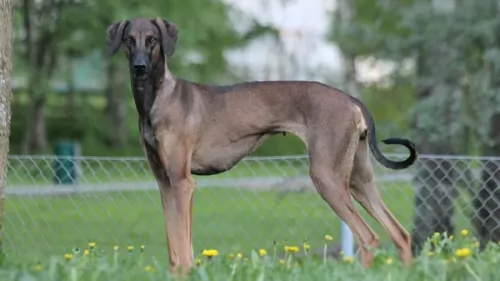 Sloughis are independent, strong willed dogs who will need a firm owner who is consistent, fair and firm.
Sloughis are independent, strong willed dogs who will need a firm owner who is consistent, fair and firm.
They're tall, slender dogs, elegant to look at and low maintenance with their short coats.
They are calm and dignified and when you make one of them your friend, companion and pet, you’re going to enjoy years of devoted companionship and loyalty.
 The breed is a hardy one and Brittanys are mostly healthy dogs. In Europe 1 in 5 dogs dies of old age and that age is usually 14 or 15 years. They do have a few issues that they may be susceptible to. These would include:
The breed is a hardy one and Brittanys are mostly healthy dogs. In Europe 1 in 5 dogs dies of old age and that age is usually 14 or 15 years. They do have a few issues that they may be susceptible to. These would include:
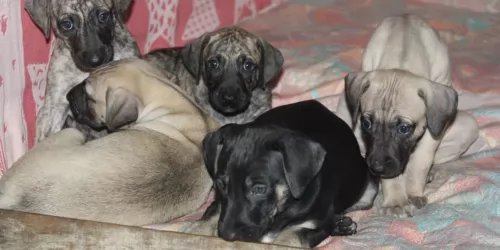 Only a few genetic conditions are found in this breed and these can be the likes of autoimmune disorders such as eye disease, Addison's disease and irritable bowel syndrome.
Only a few genetic conditions are found in this breed and these can be the likes of autoimmune disorders such as eye disease, Addison's disease and irritable bowel syndrome.
These dogs are also sensitive to anesthesia as well as some medications. Other illnesses to look out for with this large dog are cancer, bloat and diabetes.
 Don’t overfeed your Brittany. Keep him at hunting weight by feeding a half a cup up to 2 cups per day depending on the size of your dog and activity levels. Serve this in two meals not one.
Don’t overfeed your Brittany. Keep him at hunting weight by feeding a half a cup up to 2 cups per day depending on the size of your dog and activity levels. Serve this in two meals not one.
Ears – prone to infections – make sure that you check them and wipe them out routinely to prevent infections.
Hip Dysplasia – bones don’t fit well into joints – this can be genetic or otherwise, causing lameness and arthritis. If severe it can require surgery to correct.
Epilepsy – mild or serious seizures are possible. This can be genetic/hereditary but is set off by an infectious disease of the brain, head injury, poison, tumor, or metabolic disorder. There is no cure, but medication can be very effective.
Hypothyroidism – Low levels of thyroid hormone – can cause drooping eyelids, obesity, lethargy, mental difficulties or irregular heat cycles or all of this. Medication is available as it is for humans but must be taken daily for the rest of the dog’s life
Canine Discoid Lupus Erythematosus – autoimmune disease that is rare in dogs. Cats and humans can also have it. It is a skin disease and does not become the more serious and deadly Systemic Lupus. The Discoid version of this disease causes loss of pigmentation and a scaling on the nose which can then progress to the skin around the ears, eyes and genitals. There could be ulcerated lesions and tissue death in more severe cases. Sun exposure can make the condition worse.
The Brittany is a hunting dog that acts like a pointer but will retrieve fowl and birds in the water or on land. If you don’t hunt, the Brittany can still be your family dog. They need lots of exercise and mental stimulation. They need a job if they are not going to hunt and expect them to be distracted by every bird they see. Try flyball, agility, FAST CAT, field trials and dock diving. They are very task oriented and have boundless energy. They excel at obedience and confirmation as well.
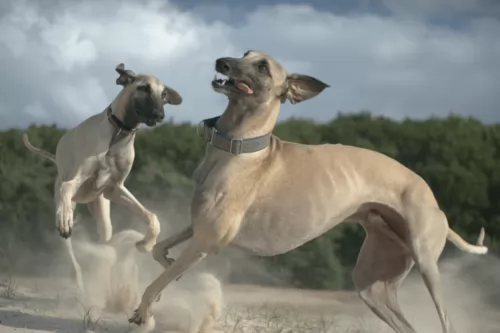 The Sloughi's coat is short and smooth and he also doesn’t have an undercoat. He is looked upon as low maintenance as he just needs a good brush every now and then to rid the coat of loose hairs and to keep him nice and shiny.
The Sloughi's coat is short and smooth and he also doesn’t have an undercoat. He is looked upon as low maintenance as he just needs a good brush every now and then to rid the coat of loose hairs and to keep him nice and shiny.
The Sloughi dog can be fed dry kibble, but it should be a top quality one – one for large, athletic dogs. The dry kibble is useful in that it helps to keep his teeth clean.
To add some tasty variety to your pet’s diet feed him some home made food occasionally. All chopped up, boiled chicken, brown rice or pasta and spinach, sweet potatoes and carrots are a healthy choice for your Sloughi and can be added to the dry kibble. Simple food like this keeps digestive problems at bay.
Try and include some raw meat into the diet as this can help in fighting off horrible skin diseases. Make sure he has constant access to fresh, cool water.
Sloughis love to be active and to have a good run. If you live near a park, allow him off the leash to have a chance to run. Alwys check first though, that it is safe to do so and that your loughi doesn’t try and fight with other dogs off the leashh or accidentally knock over a small child. If you’ve got a big garden, throw a frisbee or ball for him. It is important for him to get a good dose of exercise.